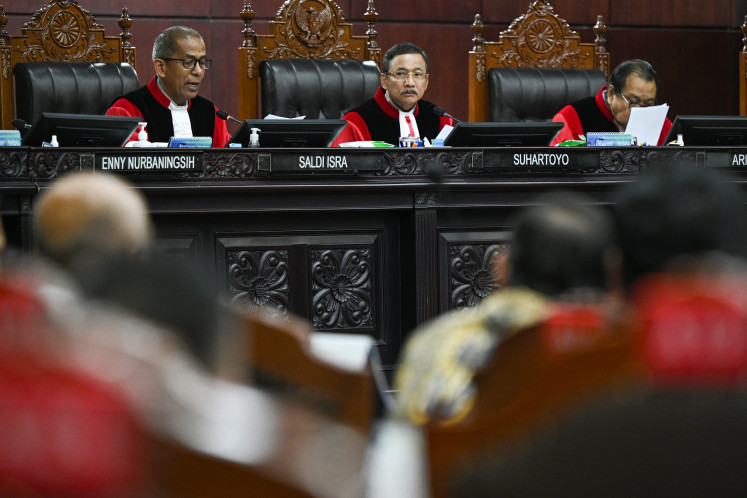Popular Reads
Top Results
Can't find what you're looking for?
View all search resultsPopular Reads
Top Results
Can't find what you're looking for?
View all search resultsIndonesia vows 700Mt gas emission cut by 2020
Strangely isolated: An unidentified delegate from Sierra Leone follows discussions in a nearly empty plenary hall during a working session on the second day of the UN Climate Summit in Copenhagen on Tuesday
Change text size
Gift Premium Articles
to Anyone
S
span class="caption">Strangely isolated: An unidentified delegate from Sierra Leone follows discussions in a nearly empty plenary hall during a working session on the second day of the UN Climate Summit in Copenhagen on Tuesday. AP/Anja Niedringhaus
Indonesia has reaffirmed its commitment to take part in the global emission cut plans and promote a low-carbon economy to help protect the planet from human-induced climate change.
Chief negotiator Rachmat Witoelar announced for the first time Indonesia would cut 700 megatons of greenhouse gas emissions by 2020 (or equal to 700 million metric tons of carbon dioxide or CO2).
“We estimate our emissions will reach 2600 megatons by 2020 at this rate. We need to commit to a 700 megaton cut to protect the planet,” he told a press briefing at the Bella Center during the Dec. 7-18 Copenhagen talks.
Rachmat declined to elaborate on the total allocation from the state budget needed to achieve such huge cuts, or the plans to meet the target.
“I think the immediate efforts would be to stop forest fires,” he said.
It remains unclear how the Indonesian government came up with the figure as, prior to their arrival in Copenhagen, officials failed to provide information on the country’s projected emissions by 2020.
A study by the State Environment Ministry said Indonesia emitted only 1.4 million tons of CO2 in 2000, less than half the 3 million tons reported by the World Bank and the UK’s Department for International Development (DFID).
A McKinsey study commissioned by Rachmat’s National Council on Climate Change (DNPI) office, said Indonesia’s emission would reach 2,800 megatons in 2020 from 2,300 megatons in 2005.
“This is a scientifically realistic figure, because it was agreed to in the Cabinet meeting,” he said.
Indonesia is the first developing nation to have pledged a voluntarily emissions cut.
At September’s G20 summit in Pittsburgh, Indonesia’s President Susilo Bambang Yudhoyono pledged to cut emissions by 26 percent by 2020 using the state budget and by 41 percent if developed nations gave financial support to do so.
His remarks shocked his aides in Jakarta since there had been no discussions before the announcement.
However, Indonesia immediately received plaudits for the pledge.
A number of developed countries, including the United Kingdom and Norway, have already pledged supports to Indonesia to meet its target.
President Yudhoyono will travel to Copenhagen to seal a deal on the climate change agreement.
The Copenhagen climate talks will discuss two main issues: the emission cut target and formulating a new legally binding treaty to replace the Kyoto Protocol that will expire in 2012.
The protocol, the only international binding emission cut treaty, required 37 developed nations to cut their emission by 5 percent from 1990 level. But only a few have met the target.
The United States has turned down the binding emissions cuts under the Kyoto Protocol citing negative impact on economic growth.
US President Barack Obama has offered to reduce his country’s emissions by 17 percent by 2020 from 2005 levels. This offer represents a 3 to 4 percent reduction against 1990 levels.
Unlike industrialized nations, developing countries’ targets are not expected to be made legally binding.
Before the conference, China said it would, by 2020, reduce gases by 40 to 45 percent below 2005 levels for energy used versus economic output.
India has offered a 20 to 25 percent slowdown in emissions growth.
Rachmat said Indonesian delegates would also focus on pushing developed nations to provide funds to developing countries to mitigate and adapt to climate change.
When asked how much money Indonesia needed to achieve a 41 percent cut in emissions, Rachmat said, “We are still calculating it.” Presumably, he meant at the Cabinet meeting.
The 2009 World Development Report showed between US$140 billion and $175 billion would be needed annually to help developing countries implement mitigation measures.
The European Union said the cost to help developing nations fight impacts from global warming was about $100 billion per year. But developing countries say rich countries should pay between 0.5 percent and 1 percent of their gross domestic product.










